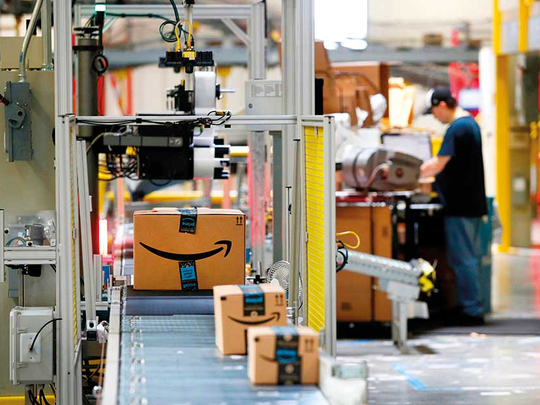
New York
One of Amazon’s antagonists seized the moment last month with an unusual newspaper advertisement addressed to President Donald Trump.
The ad, from a non-profit that advocates less government, attacked a Defense Department technology contract that Amazon intends to bid on, calling it a lucrative handout for the company. A top think-tank critic of Amazon’s market power also credited Trump on Twitter this month for blasting the internet retailer’s relationship with the US Postal Service.
And the head of a leading labour union said more Americans in both parties should speak out, as Trump has, about Amazon’s harmful effect on jobs.
As Trump has become Amazon’s basher-in-chief with his frequent Twitter attacks on the company and its chief executive, Jeff Bezos, the president has also become an unlikely ally for an array of Amazon critics. Most of them have struggled for years to build any momentum for their arguments, since Washington officials mostly held Amazon up as a beacon of innovation and shoppers saw little to dislike in its prices, selection and convenience.
Now “what Trump is essentially doing is telling the political ecosystem: Here is how you achieve your business ends,” said Blair Levin, a fellow at the Brookings Institution and a former chief of staff for the Federal Communications Commission. “He is signalling: If you want to go after Amazon, go ahead. Load up your guns.”
But while Amazon’s opponents now have the most powerful bullhorn on their side, they aren’t entirely comfortable with the association. Some are concerned about the president’s motivations for his attacks, which people close to Trump have said are often triggered by negative coverage of his administration in “The Washington Post”, a newspaper owned by Bezos.
Trump has mingled his attacks on Amazon and the newspaper in some tweets, including one in early April slamming “the Fake News Washington Post, Amazon’s “chief lobbyist”.”
Matt Stoller, a fellow at the Open Markets Institute, a think-tank that has become a vocal critic of the power of tech companies, said he believed Amazon was worthy of action by regulators in part because of its power in the book market. But he also said he found Trump’s efforts to “personalise law enforcement” troubling.
“What he’s doing is a threat to democracy, but so is Amazon,” Stoller said. “That’s the dilemma.”
Still, after Trump launched another Twitter tirade against Amazon’s deal with the Postal Service, Stoller jumped on board on Twitter. “On the post office shipping charges Trump is correct and oddly aligned with postal employees while Bezos isn’t, so I’m going to stick with the postal employees,” he wrote.
The most direct effort to tap Trump’s hostility toward Amazon was an advertisement about the contract to provide cloud computing services to the Defense Department — worth up to $10 billion (Dh36.7 billion), by some estimates. The ad, with a picture of Bezos looking chummy next to Defence Secretary Jim Mattis, appeared in the president’s favourite hometown tabloid.
“President Trump: Your Defence Department is set to award a no-bid, ten-year contract for all its IT infrastructure to Administration-enemy Jeff Bezos’ Amazon,” read the ad in “The New York Post”.
“I had never seen that before,” Katell Thielemann, an analyst who follows the government technology contracting market for the research firm Gartner, said of the attack ad.
Trump recently escalated his attacks on Amazon with a presidential order to review the Postal Service’s financial model, which he has denounced on Twitter as money-losing because of favourable deals worked out with Amazon.
“The playing field has to be levelled,” he told reporters this month, promising to take a serious look at policies that might affect Amazon.
Trump’s Amazon attacks have amplified criticisms that have been building for years among research groups and trade organisations that represent Amazon’s rivals. They have produced studies that say Amazon’s warehouses — which employ more than 125,000 full-time workers in the US — don’t increase total local employment because of losses in other sectors.
They also question the wisdom of subsidies to attract them. The American Booksellers Association, which represents independent bookstores, recently published a similar report on Amazon’s economic impact.
The United Food and Commercial Workers International Union, one of the largest private-sector unions in the US, representing 1.3 million workers in grocery stores and related industries, said Amazon’s investments in automation would hurt workers. Since it bought Whole Foods last year, Amazon has become one of the union’s top concerns.
Asked about Trump’s attacks on Amazon, Marc Perrone, president of the union, said: “Allowing Amazon’s unchecked growth to continue will lead to the destruction of millions of American jobs. Which begs the question: Why aren’t all Democrats and Republicans speaking out?”
It’s unclear if Trump can do much to get antitrust enforcers at the Federal Trade Commission or Justice Department, which are supposed to keep politics out of competition cases, to act against Amazon. But his executive order asking for a review of the Postal Service, including its relationship with customers like Amazon, could lead to changes unfavourable to the company.
In a recent opinion piece about Trump’s attacks on Amazon, social critic Thomas Frank said he didn’t believe Trump would use antitrust laws to challenge Amazon, even though Frank would approve of such a move.
“I don’t like Amazon, and I don’t like Donald Trump either,” he wrote in “The Guardian”, the British newspaper.
— New York Times News Service











